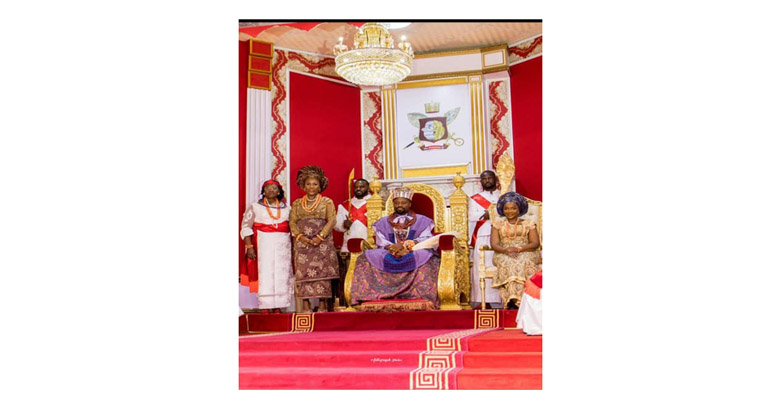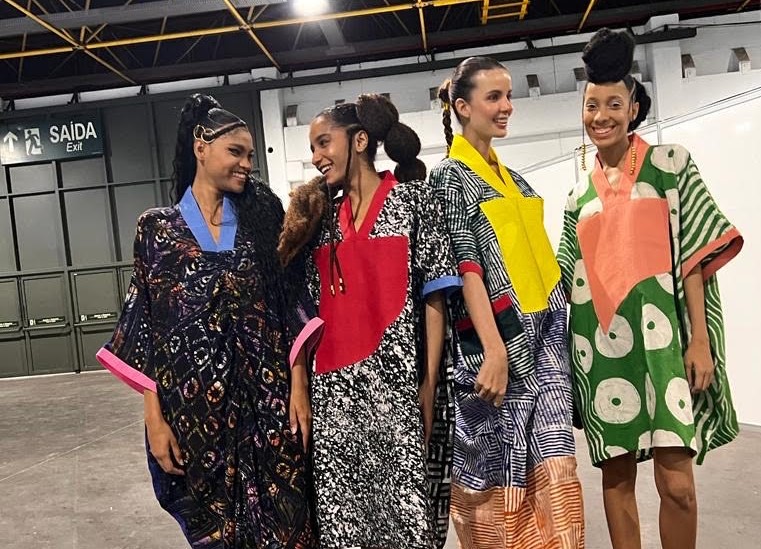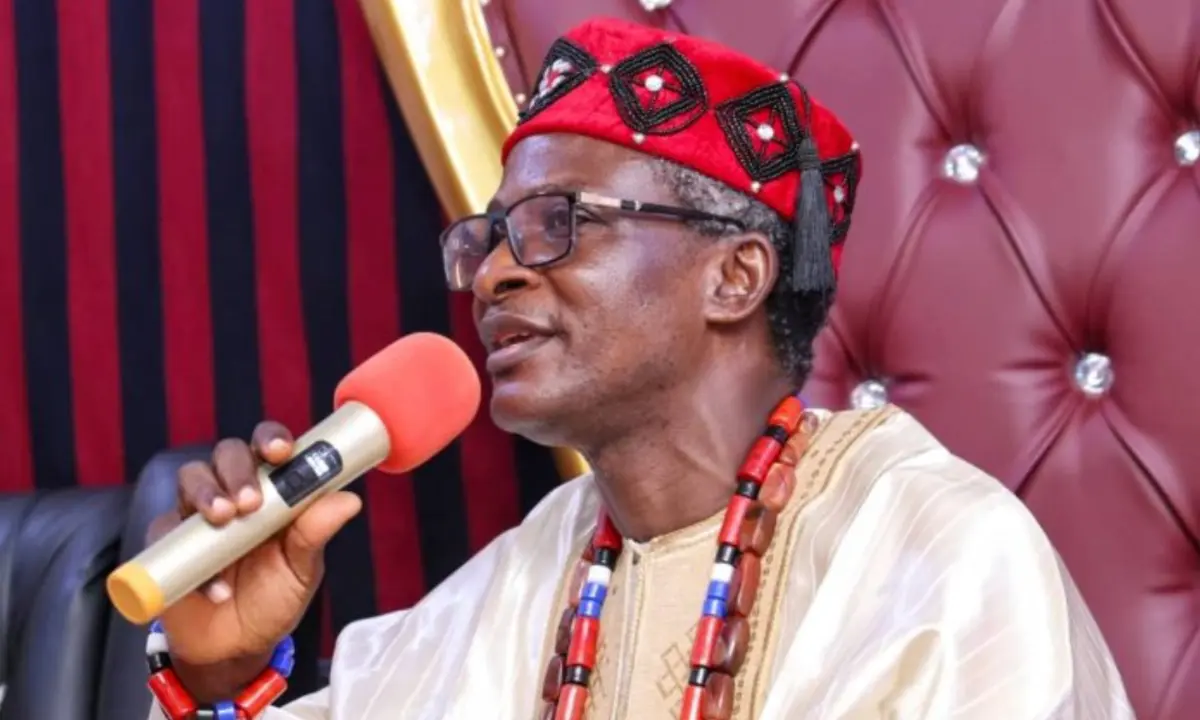Culture
The Story Of Oyotunji: A Yoruba (West Africa) Kingdom In United States Of America
Published
2 years agoon
By
Lanre
Oyotunji African Village is a village located near Sheldon, Beaufort County, South Carolina that was founded by Oba Efuntola Oseijeman Adelabu Adefunmi I in 1970. Oyotunji village is named after the Oyo empire, a pre-colonial Yoruba kingdom lasting from the 1300s until the early 1800s in what is now southwestern Nigeria. The name literally means “O̩yo̩ returns” or “O̩yo̩ rises again” or “O̩yo̩ resurrects” referring to the African Yoruba kingdom of Oyo, now rising in a new form near the South Carolina seashore.

Oyotunji, Adefunmi
Oyotunji village covers 27 acres (11 ha) and has a Yoruba temple which was moved from Harlem, New York to its present location in 1960. It was originally intended to be located in Savannah, Georgia, but was eventually settled into its current position after disputes with neighbors in Sheldon proper, over drumming and tourists.
HOW OBA EFUNTOLA ADEFUNMI I FOUNDED OYOTUNJI
During the slave trade era, many Africans were taken as slaves abroad. While going, some left with their culture and tradition which they continued within the foreign land where they found themselves. They continued with the culture and tradition of their fathers so as to maintain their identity.
The Yorubas in slavery are among the Africans that maintained their culture in the strange land and it was handed down to their children from generation to generation.
Many of their children, after the abolition of the slave trade, have married children of their former masters thus having children of mixed blood, that notwithstanding, they still carry on with their African culture in the foreign land since most of them cannot trace their root back to Africa.
The Yoruba culture has been one of the prominent and most celebrated one throughout the world till date. In the faraway United States of America, there is a Yoruba community named O̩yo̩tunji African Village. It is located near Sheldon, Beaufort County, South Carolina.
O̩yo̩tunji is regarded as North America’s oldest authentic African village. It was founded in 1970 and is the first intentional community in North America, based on the culture of the Yoruba and Benin tribes of West Africa.
It has survived 51years of sustaining the Yoruba traditional sociology and values in the diaspora. The village is named after the O̩yo̩ Empire, and the name literally means “O̩yo̩ returns” or “O̩yo̩ rises again” or “O̩yo̩ resurrects”. The village occupies 27 acres of land.
O̩yo̩tunji was founded by His Royal Highness O̩ba (King) Waja, O̩funto̩la Oseijeman Adelabu Adefunmi I.
Born Walter Eugene King on October 5, 1928, Oba O̩funto̩la Oseijeman Adelabu Adefunmi I, a Detroit native, began studying Afro-Haitian and ancient Egyptian traditions as a teenager. He was further influenced by his contact with the Katherine Dunham Dance Troupe in New York City at the age of 20, an African American modern dance troupe that drew from many cultures within the African Diaspora.
Also Read: Five years after, Lagos Inaugurates Randle Centre for Yoruba Culture and History
August 26, 1959, O̩ba Waja became the first African born in America to become fully initiated into the Oris̩a-Vodoo African priesthood by African Cubans in Matanzas, Cuba, and became known as Efuntola Osejiman Adefunmi. After his return to the United States, he formed the Yoruba Temple in Harlem in 1960. The temple, committed to preserving African traditions within an American context, was the cultural and religious forerunner of Oyotunji Village.
He later traveled to Haiti where he discovered more about the Yoruba culture. Armed with a new understanding of the African culture, he found the order of Damballah Hwedo, Ancestor Priests in Harlem New York.
This marked the beginning of the spread of the Yoruba religion and culture among African-Americans. He later founded the Sàngó Temple in New York and incorporated the African Theological Arch Ministry in 1960. The Sàngó Temple was relocated and renamed the Yoruba Temple.
With the rise of black nationalism in the 1960s, King began to envision the construction of a separate African American nation that would institutionalize and commemorate ancestral traditions. In June of 1970, he fulfilled this vision with the creation of Oyotunji African Village.
It was during this time that he also established a new lineage of the priesthood, Orisha Vodoo, to emphasize the tradition’s African roots. Today, over 300 priests have been initiated into this lineage and the African Theological Archministry, founded by Oba O̩funto̩la Oseijeman Adelabu Adefunmi I in 1966, now serves as the umbrella organization for the Village.
To further his knowledge of Yoruba culture, he traveled to Abeokuta in Nigeria in 1972 where he was initiated into the Ifa priesthood by the Oluwo of Ije̩un at Abeokuta, Ogun state, in August of 1972. He was later proclaimed Alase̩ (Oba-King) of the Yoruba of North America at O̩yo̩tunji Village in 1972.
In its early years, Oyotunji Village was home to as many as two hundred people. Today, its residential community consists of few African American families, governed by an oba (king) and the community’s appointed council.
Each family is committed to the teachings of the Yoruba tradition, which include a religious understanding of the world as comprised primarily of the “energies” of the Supreme Being Olodumare, the orisha deities, and the ancestral spirits. This religious world is maintained spiritually through rituals, chants, music, sacrifice, and annual ceremonies.
Oba Efuntola Osejiman Adefunmi passed away on Thursday, February 10th, 2005 at O̩yo̩tunji African Village in Beaufort County, South Carolina. Since Adefunmi’s death in 2005, the village has been led by his son, the fourteenth of twenty-two children of Oba Efuntola Osejiman Adefunmi, till date.
The O̩ba title is referred to as “O̩lo̩yotunji” of O̩yo̩tunji.
Related
You may like


Makinde Pledges Tourism-Led Growth for Oyo Economy


WelcomeToNigeria Expo 2025 Repositions Domestic Tourism for Economic Growth


Brazilian Ifá Temple delegation visits Ekiti ahead of September spiritual pilgrimage


Adire Fashion: Lagos backs global push for indigenous textiles


Oniru of Iru kingdom seeks Hilton investment for tourism


ATPN endorses Things Fall Apart Festival 2025

Tara Fela-Durotoye receives the Royal Order of Iweri Award from the Olu of Warri, honoring her excellence and cultural impact (more…)
Related
Culture
Adire Teems Nigeria shines at CANEX 2025
Published
17 hours agoon
September 10, 2025By
akonitv
Adire Teems Nigeria shines at CANEX 2025 in Algeria, showcasing African creativity and culture through innovative Adire fashion
Related
Culture
Idoma Council Nullifies Chieftaincy Titles Conferred on President Tinubu
Published
1 day agoon
September 9, 2025
Idoma Council nullifies chieftaincy titles given to President Tinubu and others, citing violation of traditional laws and suspension of title conferments
Related

Idoma Area Traditional Council Denies Nullifying President Tinubu’s Title

Tara Fela-Durotoye Receives Prestigious ROI Award

Igwe Emelobe of Oba Vows to Clean Up City’s Image, Restore Peace
Trending

 Business2 years ago
Business2 years agoOoni of Ife Discusses Business and Peace Initiative in Kenya

 Events3 years ago
Events3 years agoGlamour, glitz as B’obagunwa Omo’ba Obinrin Akile Ijebu celebrates New Year party (Photos)

 Culture3 years ago
Culture3 years agoOutrage as Ezendigbo of Ibadanland confers chieftaincy title on Olubadan

 Events3 years ago
Events3 years agoOnitoomu of Ito-Omu installs two new chiefs (Video, Photos)

 Culture3 years ago
Culture3 years agoThe Four Igbo Market Days and Their Significance In Omenala ÌGBÒ

 Events1 year ago
Events1 year agoEgbe Bobasete: The New Fashion Sensation Elevates 2024 Ojude Oba Festival (Video, Photos)

 Paranormal3 years ago
Paranormal3 years agoBlack Cat Superstition: Good and Bad Luck Beliefs

 Events2 years ago
Events2 years agoLaminisa I, HRM Oba Dr. Lawal, marks 15years on throne




























